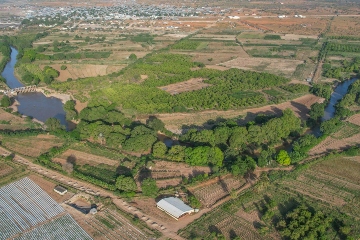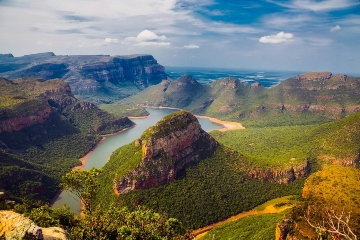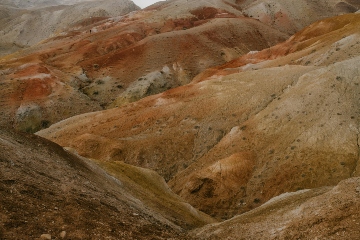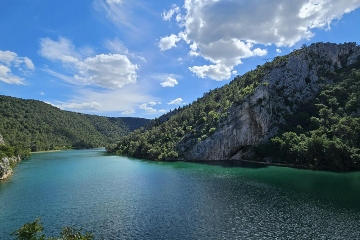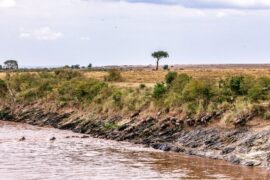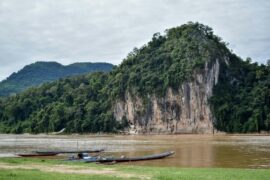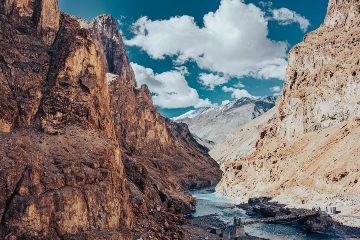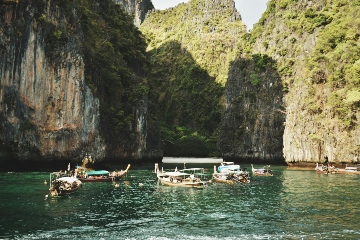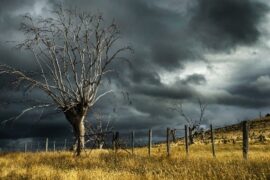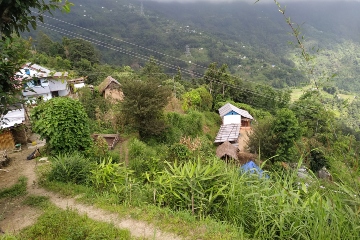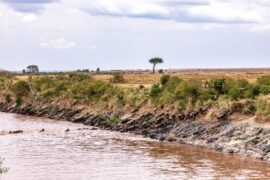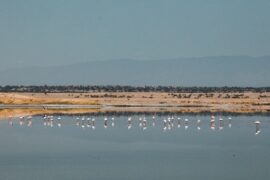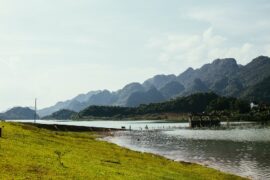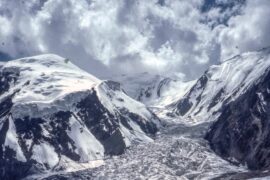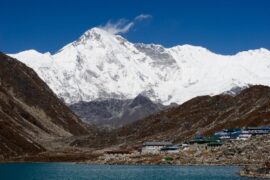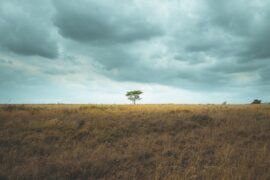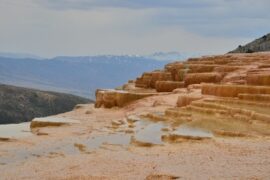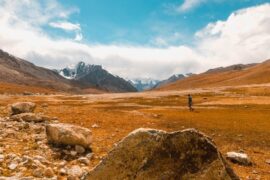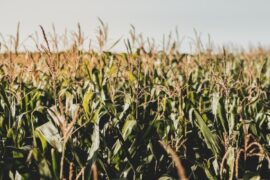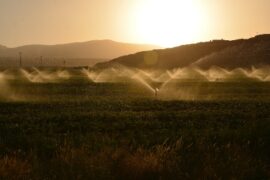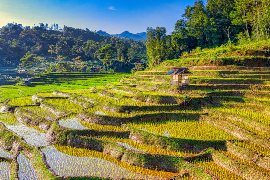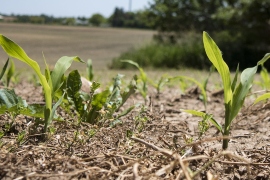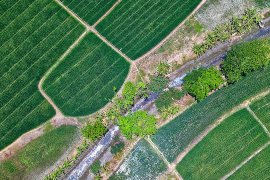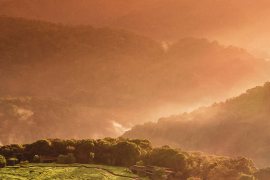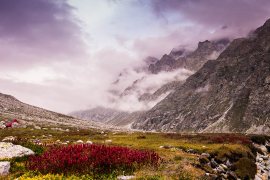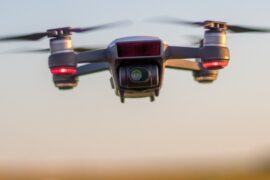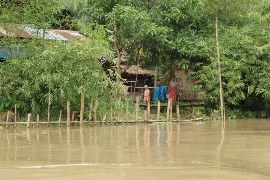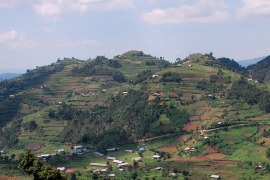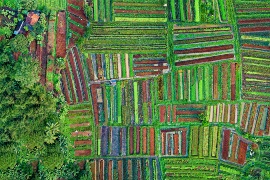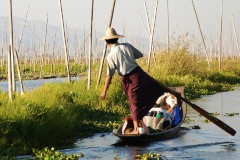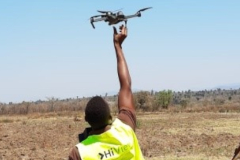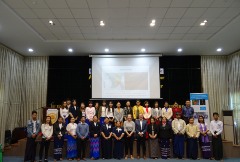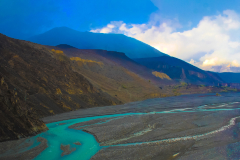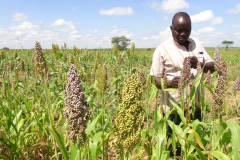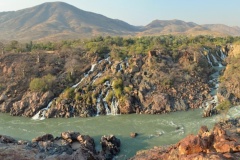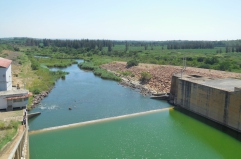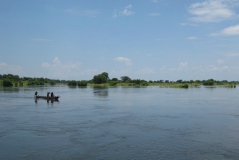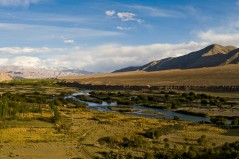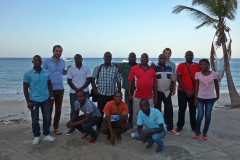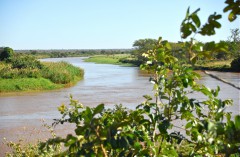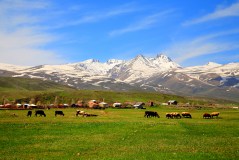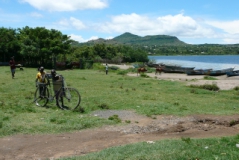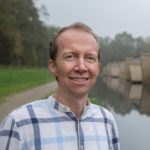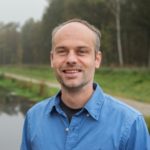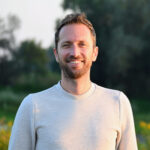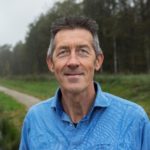Challenge
Climate change, increasing water demand, increasing demand for food and other products, increasing intensity of drought and flood events are just a few examples that show that the pressure on our planet and our natural resources is increasing. Moreover, projections for the future show that this pressure is only likely to increase further. This indicates that it is becoming increasingly important to collect more (scientific) knowledge about the sustainable use of our natural resources and to share this knowledge as much as possible with as many people and organizations as possible. It is therefore important that sharing knowledge leads to the training of people who can further develop and disseminate this knowledge. The term “Capacity Building” is often used for this.
Sharing knowledge, however, is a profession in itself. People and organizations often differ in terms of substantive knowledge, and experience undertaking tasks such as collecting, sharing and using (open source) data, models and techniques can differ enormously per country and per organization. Any organization providing a training therefore needs a thorough understanding of the subject, the problem definition and the background of the participants. This shows that a project involving capacity building often requires very specific preconditions.
FutureWater approach
Capacity Building is something in which FutureWater has gained extensive experience. FutureWater has a unique combination of scientific knowledge combined with consultancy work in (agri-)hydrology, climate change, remote sensing and flying sensor related techniques. Because of this combination, FutureWater is very capable of making complex substantive scientific concepts and techniques understandable and insightful for a very diverse audience. In recent years, FutureWater has given training courses in various countries around the world to train local organizations in the use of, among others, hydrological (SPHY) and water allocation models (WEAP), the use of remote sensing techniques (Google Earth Engine) and the use of Flying Sensors. The audience at these training courses is often very varied, from policy makers to experts.
The training courses that FutureWater provides are therefore often tailor-made, depending on the questions of the organization concerned and the knowledge and background of the participants in the training courses. In general, a unique manual is developed for each training, in which both theory and substantive assignments are combined. The training courses provided by FutureWater are often on-location in the country of the requesting organization, but “eLearning” is also something that FutureWater has been using more and more in recent years. FutureWater considers sharing knowledge to be of paramount importance and considers it equally important that the transferred knowledge is actually being used by the participants after a training. Therefore, training sessions are almost always provided with the use of open source software and data. Next to that, FutureWater often provides a period after the training in which the participants can ask questions to the trainers of FutureWater. Both the use of open source products and the option to ask questions after a training makes it easier for participants to actually put the acquired knowledge into practice.
Related projects
-
Drought Forecasting Model for Somalia/Somaliland
This project aims to strengthen drought preparedness and response in Somalia and Somaliland by enhancing the technical and operational capacities of the Somali Disaster Management Agency (SODMA) and Somaliland’s National Disaster Preparedness and Food Reserve Authority (NADFOR). Led by the World Food Programme (WFP), FutureWater and Galayr will work on...
-
WE-HARP: WEAP Permits Tool for ARA-Sul
FutureWater is carrying out an assignment to improve the WEAP-Permits Tool: WE-HARP, which supports ARA-Sul in evaluating water use licenses in the Pequenos Libombos area. This project builds on earlier efforts, refining the tool based on feedback from ARA-Sul’s technical professionals. By embedding the tool within ARA-Sul’s operations, FutureWater aims...
-
Water Accounting in Mongolia
Water Accounting offers data-driven insights into water availability, use, and allocation, helping policymakers balance demands across sectors like agriculture, industry, and urban development. It supports sustainable growth by ensuring efficient water use while protecting resources for the future. By accounting for different interventions and projections, it offers climate-resilient water resources...
-
SPHY QGIS Plugin for Hydrological Modeling
SPHY (Spatial Processes in Hydrology) is a conceptual, spatially distributed (raster-based) “leaky-bucket” type water balance model. Developed by FutureWater, with the support of national and international partners, SPHY has emerged as a robust, user-friendly tool for undertaking operational and strategic water resource management decisions. It stands out for its physical...
-
Monapo Catchment Water Allocation Model in Support of ARA-Norte in Mozambique
The aim of this project is to advance water system analysis for ARA-Norte, the regional water administration authority in Mozambique, focusing on the Monapo Catchment. In collaboration with ARA-Norte's hydrologists, we're crafting a Water Allocation Model employing the Water Evaluation And Planning (WEAP) system.
-
Model Development and Hydrological Assessments to Inform Ecosystem-based Adaptation Solutions in Lao PDR
The GCF project “Building resilience of urban populations with ecosystem-based solutions in Lao PDR” aims to test an alternative approach to flood control in urban Laos, moving away from a traditional focus on grey infrastructure, such as dams and concrete drainage systems, and towards Ecosystem-based Adaptation (EbA). A consortium led...
-
Springshed Management in the Indian Himalayas
Springs in the Hindu Kush Himalaya (HKH) region are essential for water security, agriculture, economic activities, ecosystem services, biodiversity, and cultural heritage. They sustain nearly 240 million people, including 50 million in India who depend directly on these springs for their water needs. However, almost half of the perennial springs...
-
Capacity Building on Water Accounting Under the Water Scarcity Program in Lao PDR
The capacity-building program on water accounting in Lao PDR focuses on enhancing participants' understanding of the status of water resources in the Nam Ngum pilot basin and enabling them to quantify the fluxes using various tools, including remote sensing.
-
Increasing Investments in Early Warning Systems to Strengthen Climate and Disaster Resilience
This project aims to support the development of a new multi-hazard Early Warning System (EWS) facility, addressing the significant exposure of countries in Asia and the Pacific region to disaster risks. The enhancement of EWS aligns with global commitments, such as the Paris Agreement, Nationally Determined Contributions (NDCs), Sustainable Development...
-
RoSPro: Roadside Spring Protection to Improve Water Security in Nepal
The mid and high-altitude areas of the Himalayas face a critical water scarcity issue, making them one of the most vulnerable regions in the world. Springs are essential lifelines for millions of mountain communities, serving as the primary source of domestic water and local food security. Unfortunately, the flow regimes...
-
Water Evaluation And Planning Training for the Umbeluzi Catchment
ARA-Sul is improving their decision-making procedures. One component is improved water allocation planning. FutureWater has developed for the Umbeluzi two Water Allocation Models (WAMs) in 2014. A refreshing workshop for water managers and decision makers was held in June 2023.
-
WEAP Ground Water Modelling in Mozambique
Groundwater availability is critical to the Umbeluzi Catchment. Currently, there is a need for a simple tool that can asses the availability of resources in the ground. This especially to asses the permits for groundwater extractions. It is expected that a simplified modelling approach can provide a trend analysis sufficient...
-
Capacity Building on Water Accounting Under the Water Scarcity Program for Asia-Pacific
Growing water scarcity continues to threaten the agricultural sector in Asia. In order to address this critical issue, FAO and partners have been developing a comprehensive Asia Pacific Water Scarcity Programme (WSP) since 2019. Under this program, a series of trainings on water accounting will be held in Indonesia, Vietnam...
-
Integrated Water Resources Management in Tajikistan
Given the abundant freshwater resources in Tajikistan, water plays a crucial role in the country's socioeconomic development. However, the rising population, economic growth, and the growing impacts of climate change pose significant challenges to ensure water availability and accessibility. This project aims to address the aforementioned information gap by improving...
-
Climate Risk and Adaptation Assessment for Hydropower Project in Nepal
Climate risk and adaptation (CRA) assessment is required for the 635 MW Dudhkoshi hydroelectric project (DKSHEP) to ensure the project addresses climate change mitigation and adaptation in accordance with ADB’s requirements. The initial Climate Risk Assessment (CRA) by FutureWater in 2021 suggested the project is likely to be affected by...
-
Climate Change Impact Modelling Tana Basin, Kenya
FutureWater held for knowledge exchange sessions with the Water Resources Authority responsible for the WEAP model of the Tana Basin. The training focused on how to extract Climate Change data, how to interpret this data, and how to set-it up within the WEAP model.
-
Tailor-made Training on Data-Driven Capacity for Ecosystem Services and Management in Iran
This tailor-made training, funded by Nuffic as part of the Mena Scholarship Programme and requested by The Center for Conservation and Development of Sustainable Ecosystems (ZIPAK) in Iran, focused on providing participants with relevant hands-on experience in tools and techniques to enhance their capacity to manage (protected) ecosystems in Iran.
-
Capacity Building on Water Accounting in Pakistan
The Food and Agriculture Organization of the United Nations (FAO) in Pakistan has recently secured Green Climate Fund (GCF) funds for increasing the climate resilience of agriculture and water management in the Indus Basin. Given the region’s climate vulnerability, it is critical to improve information services and build the country’s...
-
Tailor-made Training on Geo-spatial Data Skills Development in Zambia
This tailor-made training, funded by Nuffic and requested by the staff of the The Ministry of Agriculture of the Government of the Republic of Zambia (GRZ), aims to help improving soil water management and crop productivity at the national level. The training focuses on building capacity of participants in accessing...
-
Follow the Water: Reuse of Water in Irrigated Systems
Reuse of water in irrigated systems is a key component in design and management of irrigation systems. FAO and FutureWater developed a Guidance document, a Tool and a Training package demand for a better understanding of the role of reuse of water in irrigated agriculture systems. Those outcomes will support...
-
Training on Real Water Savings for FAO’s Regional Water Scarcity Program
The Regional Office for Asia and the Pacific (RAP) of the Food and Agriculture Organization of the United Nations (FAO) has recently secured funds to continue a program of training on ReWaS, which is a simple tool to estimate the potential for generating real water savings from various agronomic, water...
-
Tailor-made Training on Climate Smart Irrigation Strategies to Improve Salinity Control and Enhance Agricultural Production
This tailor-made training, funded by Nuffic and requested by the staff of the college of Agriculture of Basra University, aims to help mitigate soil and water salinization problems hampering agricultural production in Iraq. The training focuses on accessing and using innovative data and tools in the public domain, to gain...
-
A Practical Farmers’ Toolkit – Geodata for Climate Smart Agriculture in Egypt
The 'Farmers Toolkit' as presented in this project contains various geodata tools applicable for farmers to assist their decision-making and adopt climate smart agricultural practices. This project launches a training program on these tools, which are: Flying Sensors, irrigation advisory services (IrriWatch portal), WaPOR and Google Earthengine Apps, and Climate...
-
Bio-Physical Assessment and Hydrological Analysis for Mukungwa and Akagera Lower catchments in Rwanda
FutureWater will conduct the bio-physical assessment and hydrological analysis for the Mukungwa and Akagera Lower Catchments in Rwanda. The project will be the basis for two catchment plans to be developed through the “EIWRM Project”, funded by the Government of the Netherlands and implemented by a consortium led by the...
-
Development of a Glacio-Hydrological Model and IWRM Plan for the Uttarakhand subbasin in India
The Swiss Agency for Development and Cooperation’s (SDCs) Global Programme Climate Change and Environment (GP CCE) India is supporting the operationalization of climate change adaptation actions in the mountain states of Uttarakhand, Sikkim and Himachal Pradesh through the phase two of the “Strengthening State Strategies for Climate Action” (3SCA) project...
-
Tailor-made Advice and Training on Flying Sensors for Agriculture in Jordan
This online training was provided over a period of 8 weeks for 25 participants selected by NARC (National Agricultural Research Centre) Jordan. The online training consisted of self-paced exercises and regular live (video) sessions provided through the OpenCourseWare website of IHE Delft. The four modules provided in this training will...
-
Tailor-made Training on River Morphology and Flood Risk using State-of-the-Art Open Satellite Data and Processing Tools
The main objective is to enhance the capacity of DWIR staff in using innovative data and tools to analyze water resources and support water management. The training is organized with a very practical approach and strongly built upon the ‘learning-by-doing’ principles. Participants use freely accessible satellite-derived data to gain insight...
-
Tailor Made Training for the Rwanda Water Resources Board (RWB) on Water Allocation Modelling and Remote Sensing Analysis
FutureWater will provide a Tailor Made Training to water professionals at the Rwanda Water Resources Board (RWB) on Water Allocation Modeling and Remote Sensing Analysis. About 20 participants of the RWB are thought to work with the Water Evaluation And Planning model WEAP and the Remote Sensing platform of Google...
-
Training in Hydrology and Water Allocation Modelling for Kenyan Water Resources Professionals
This course on hydrology and water allocation modelling is organized for the Kenya Water Resources Authority (WRA) and funded by the Blue Deal program of the Netherlands. The first four-week course block introduces the participants to the main concepts in hydrology, hydrological modelling and data collection, including remote sensing. Exercises...
-
Tailor-Made Training on Crop Models and Remote Sensing for Water Management in Agricultural Systems
FutureWater, HiView and ThirdEye Kenya have partnered with Egerton University (Crops, Horticulture & Soils Department) to conduct a tailor-made training on 'Crop models and remote sensing for water management in agricultural systems'. This training project is funded by the NUFFIC - TMT program.
-
eLearning on Hydrology and Climate Change for Hydropower Professionals
Hydropower production in Indonesia is the main renewable energy source in the country. There is a potential to double the capacity by building new hydropower plants and to optimize current plants. PLN is the main hydropower company in the country. The project aims at enhancing the capacity of its staff...
-
Boundary Demarcation and Ecosystem Services Mapping of Inle Lake Region, Myanmar
The assignment supports the newly established Inle Lake Management Authority (ILMA) by developing up-to-date, spatial datasets, which are to be included in the ILMA geodatabase. More specifically, the existing Inle Lake MAB boundary and zoning are confirmed and updated. Maps of land-use and different ecosystem services are produced and validated...
-
Incorporating Flying Sensors to Increase Agricultural Productivity in Central Mozambique
The PROMAC II project is an ongoing project of NCBA Clusa introducing conservation farming practices to various locations in the Manica, Tete and Zambezia provinces, with the objective to increase agricultural productivity. This project incorporates flying sensor activities in the PROMAC II project as a M&E indicator of the practices...
-
Tailor-Made Training for water professionals in Myanmar
This tailor-made training enhanced capacity of Yangon Technological University (YTU) educational staff in using Google Earth Engine to analyse water resources and support water management. Technical staff of Department of Meteorology and Hydrology (DMH) and the Department of Water resources and Improvement of River systems (DWIR) also participated to gain...
-
Training Package and Technical Guidance for Water Productivity and Real Water Savings
The overall project objective is to compile an inventory of agricultural field interventions and develop a training package to evaluate Real Water Savings from irrigated fields, to systems and basins. A guidance document is developed for agricultural field interventions by compiling a literature database containing published experiences and results of...
-
Training on Using Open Source Platforms for Hydrological Modelling of Data Sparse Regions in Nepal
This training was attended by sixteen researchers (seven female and nine male) from IOF, Department of Hydrology and Meteorology (DHM), Central Department of Hydrology and Meteorology (CDHM), Department of Forests and Soil Conservation and the Institute of Engineering (IOE). The overall objective of this training was to ensure the use...
-
APSAN-Vale: Piloting Innovations to Increase Water Productivity and Food Security in Mozambique
The project has as its overall aim to increase climate resilient agricultural productivity and food security, with a specific objective to increase the water productivity and profitability of smallholder farmers in Mozambique, prioritizing small (family sector) farmers to increase food and nutritional security. This project will demonstrate what the best...
-
Remote Sensing Course in Angola
The project "Knowledge-to-Knowledge" (K2K), aims to strengthen and enhance the capacity of the main Angolan knowledge institutions in agricultural sciences, to establish a strong relate between knowledge and practice. FutureWater collaborates with Wageningen University on giving a training on remote sensing and GIS techniques in agricultural applications and services to...
-
Training in Water Resources Modelling for ARA-Sul
A Tailor-Made Training on Water Resources Modelling was required to equip the staff of the water agencies in Mozambique (ARAs) with additional knowledge to have a stronger advisory role towards policy and decision makers, and people living in the area. FutureWater provided this training to ARA-Sul and ARA-Norte. This training...
-
Development of a Water Allocation Model of the Incomati River Basin
Two water allocation models were developed in this project as a tool to support policy evaluation and improve strategic and operational decision making procedures of ARA-Sul. WEAP (Water Evaluation And Planning) was chosen as modelling framework. Different scenarios were implemented in WEAP to show the impacts of possible changes and...
-
Strategic Basin Planning Ganga River Basin
The World Bank has assigned Deltares and its partners AECOM India and FutureWater to carry out the project ”Analytical Work and Technical Assistance to support Strategic Basin Planning for Ganga River Basin in India”. The key objectives of this project are (i) Significantly strengthen the capability of relevant central and...
-
Training in Water Resources and Allocation Models
A Tailor-Made Training was provided to three ARAs in Mozambique, being ARA-Centro (Beira), ARA-Centro-Norte (Nampula), and ARA-Norte (Pemba). The provided Tailor-Made Training focused on learning to work with a Water Resources and Water Allocation Model, and apply them to a catchment in Mozambique. Emphasis was put on how these tools...
-
Water Allocation Model Development to Support Decision Making Procedures
Two water allocation models were developed in this project as a tool to support policy evaluation and improve strategic and operational decision making procedures of ARA-Sul, which is one of the five water management organizations in Mozambique. WEAP (Water Evaluation And Planning) was chosen as modelling framework. Different scenarios were...
-
Mainstream Climate Change Adaptation and Mitigation Into Agriculture in the Southern Caucasus
This study contributes to the agriculture sector climate change impact assessment and adaptation and mitigation strategy identification and evaluation. The study encompasses the three countries of the Southern Caucasus region: Armenia, Azerbaijan, and Georgia. The project also includes components for capacity building among in-country staff, and support of the World...
-
Impacts of Global Climate Change on the Water Resources of the Bunyala plains, Kenya
In this project an Integrated Water Resource Management Planning Tool for improved planning and management of sustainable food and sustainable livelihoods for the Bunyala flood plains of western Kenya was developed together with training materials for technical support in the maintenance and implementation of the planning tool and the facilitation...

